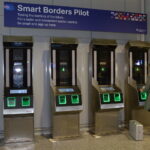The EU police agency is to receive lists of persons from foreign authorities and then have them alerted in the Schengen area for refusal of entry, arrest or observation. This legalises a questionable procedure that has long been practised.
Can the US FBI put a Tunisian national on a European database for refusal of entry, even if there is no proof that he belongs to a terrorist organisation as claimed? Should it be permissible for Europol to initiate such alerts even at the behest of an intelligence service from Serbia or Egypt, so that the person concerned is arrested when crossing the border into the Schengen area?
It is certain that the Schengen Information System (SIS II) will soon be supplemented by such a regulation. However, it was disputed between the EU Parliament and the Member States in the Council what role Europol should play in mediating such searches for third-country nationals. Tomorrow, the so-called trilogue negotiations are to be concluded with a consensus between Council and Parliament; after their formal decision in the competent bodies, the regulation would then be valid as of summer.
Proposal for direct alerts by Europol overturned
In December 2020, the European Commission had presented a proposal for the possibility of alerts by Europol in the SIS II. For this purpose, the regulation for this largest European police information system should be amended accordingly. The background to this was the renewal of the Europol Regulation, which had provided for such searches to a limited extent – exclusively if they concerned third-country nationals.
However, in the trialogue for the new SIS II Regulation, the Member States overturned the idea that Europol itself should have write access to the SIS II. Instead, the agency is to function in future as a central office for receiving lists from non-EU states for entry into the SIS II. Europol will then look for a willing member state to carry out these searches. Proposals for this can also come from international organisations such as Interpol.
Suspects are also to be reported as well
This would be possible for all crimes that fall within Europol’s area of responsibility, including serious and organised crime and terrorism. The alerts are not limited to criminals from third countries; suspects can also be entered. The EU Parliament agreed on this in the negotiations on the SIS II Regulation.
If a Member State decides to enter such an alert in the SIS II, it can choose the category itself. For example, arrest with a European Arrest Warrant (Article 26 SIS II Council Decision) or covert control (Article 36) would be possible. Any other Schengen member state must subsequently implement the measures when it finds the person.
Europol to clarify accuracy of allegations
After receiving the lists, Europol should first check whether an alert already exists in the SIS II on the persons. Then it must be clarified whether national secret services object to a police alert: In some cases, the persons concerned are being secretly observed, and a check or arrest could run counter to this.
It is questionable how Europol is supposed to check the accuracy of the alerts. It would be impossible for European police forces to prove, for example, whether accusations against a suspect from a third country are well-founded. Therefore, Europol should first exchange further information with the third country in question or Interpol after receiving such a data set.
The MEPs were able to negotiate into the draft regulation that Europol should subsequently report new findings on a proposed alert to the EU state that finally entered the person in SIS II. This applies, for example, to cases in which a foreign search request turns out to be politically motivated.
Parliament gives up many demands
In many points, the Parliament has given up its demands in the trialogue for the new SIS II Regulation. For example, it should not be possible to accept wanted lists from any country, but only from “trustworthy” third countries. However, this too is off the table.
MEPs now only demand that Europol must inform the new fundamental rights commissioner in-house or at least its data protection commissioner as soon as a person from a third country is proposed for alert. These two bodies could be involved in order to control the storage period of the entries in the member states. As things stand, this can be done for three years. However, Europol should be allowed to decide on an extension at its own discretion.
Until the new SIS II regulation is finally valid, the described procedure will continue to be practised “voluntarily”. For example, the FBI, intelligence services from Western Balkan states as well as Interpol have already sent lists of so-called “foreign fighters” to the respective EU presidency, which then looked for a willing member state to register. These lists were distributed – entirely without a corresponding regulation – via Europol. In at least 70 cases, the German Federal Criminal Police Office has also conducted such a warrant for nationals from Syria, Iraq and Morocco.
Image: OSeveno, Europol building, The Hague, the Netherlands – 878, CC BY-SA 3.0.





Leave a Reply